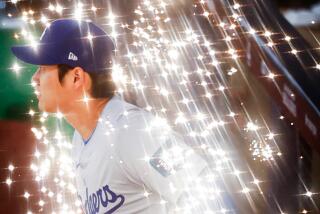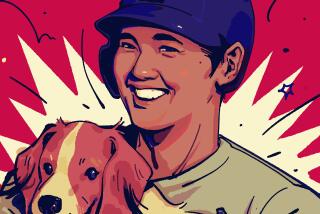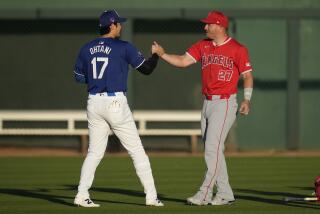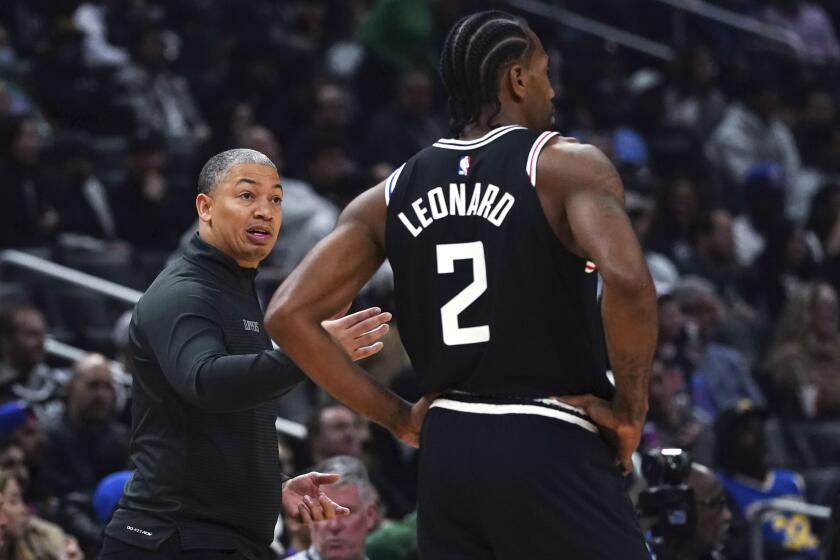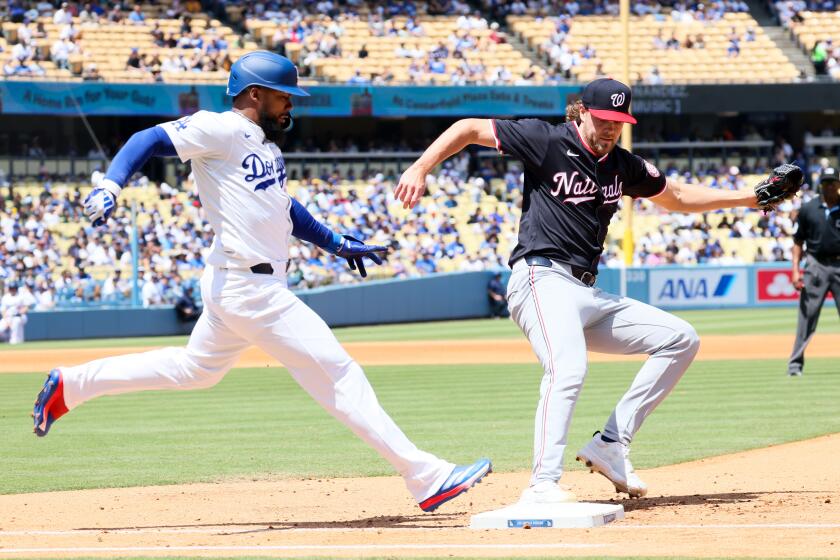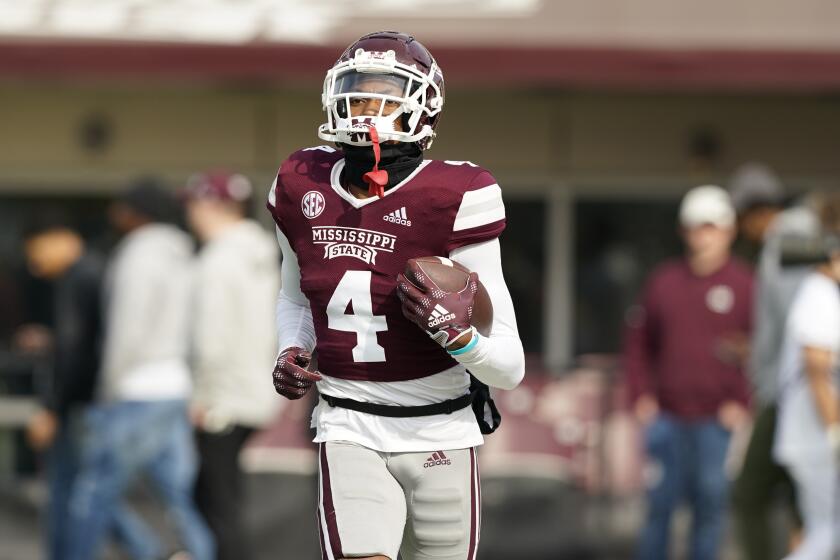Column: Shohei Ohtani shines in the spotlight of stardom during Angels introduction
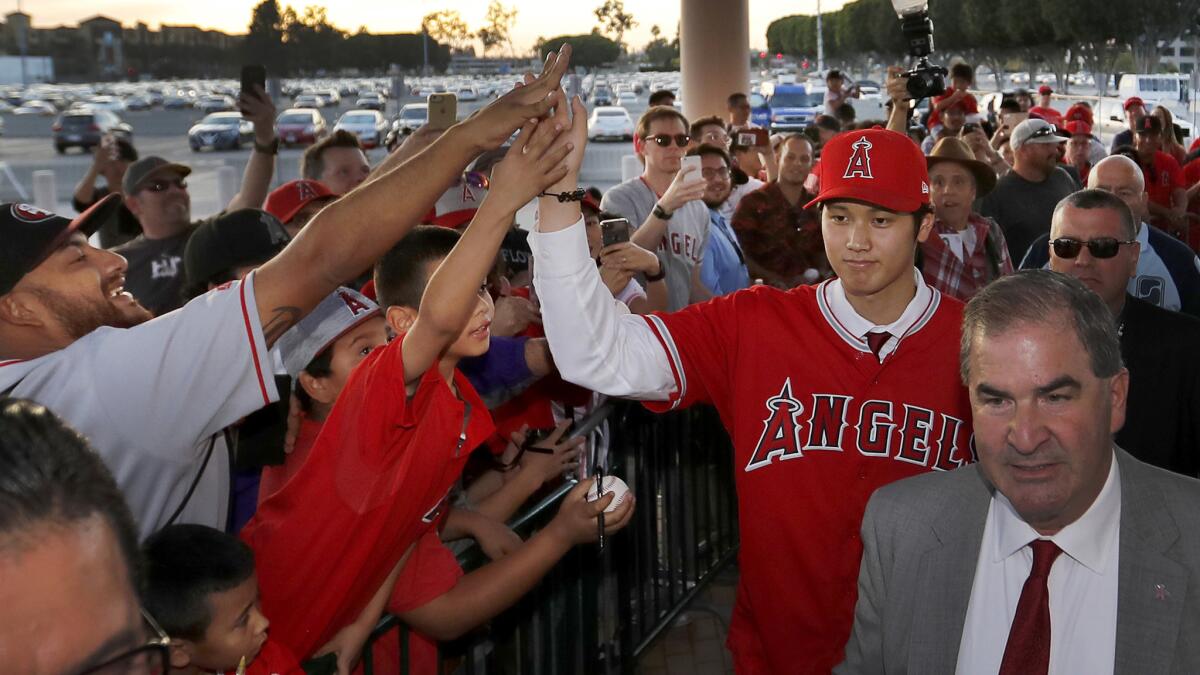
So the reasons Shohei Ohtani signed with the Angels remain a mystery, hidden somewhere behind his boyish smile and camouflaged by his polite diction.
There were no major revelations at Ohtani’s introductory news conference Saturday, as the two-way player from Japan reiterated what his representatives said in a written statement the previous day, which was that he felt a connection with the team.
The designated-hitter rule?
“It wasn’t a big part of the decision,” he said in Japanese. “National League, American League, it didn’t really matter.”
The West Coast?
“I came in with open feelings,” he said. “I wanted to make sure I didn’t disrespect any of the teams, so I wanted to listen to treat everyone equally when listening to what they had to say.”
About this connection with the Angels …
“It’s hard to express in words,” he said.
Maybe it really was that, just a feeling. Free agents already familiar with the major leagues spend weeks, if not months, finding new teams. The 23-year-old Ohtani’s searched barely lasted a week.
Still, the teams that wondered why Ohtani chose the Angels over them Friday were probably asking themselves the same questions Saturday.
The courteous evasiveness practiced by Ohtani was a reminder of how natural environments like this are to him. This is someone who was a national celebrity in Japan from the time he uncorked a 99-mph fastball as an 18-year-old high school senior. His entire adult life has been spent under a spotlight.

The Los Angeles Angels of Anaheim officially welcomed their newest addition to the club, Japanese pitcher and slugger Shohei Ohtani, during an introductory news conference at Angel Stadium.
He looks like a superstar. He smiles like a superstar and talks like a superstar.
And in the portion of the news conference that was held outside Angel Stadium, he had no problems winning over the estimated 1,000 fans in attendance.
After he received his No. 17 jersey from owner Arte Moreno, Ohtani addressed the audience — in English.
“Hi, I’m Shohei Ohtani,” he said.
He flashed his boyish smile. The crowd cheered.
Ohtani wore No. 11 in his five seasons with Japan’s Nippon-Ham Fighters, but the number was retired by the Angels in honor of Jim Fregosi.
Asked why he chose No. 17 as a replacement, Ohtani replied, “I really wanted No. 27, but it was already taken, so I chose No. 17.”
An interpreter translated his words and the crowd laughed. Mike Trout wears No. 27 for the Angels.
“I was joking about No. 27,” he later said.
Ohtani wore No. 17 in his first year in high school. He figured he should wear it again since his move to the Angels marked another new start in his life.
“It doesn’t really have a deep meaning,” he said.
When Ohtani concluded the last of his scheduled interviews Saturday, he had one final media obligation to complete, which consisted of him stepping on a stage to be photographed in his new uniform.
Standing in front of a few dozen photo journalists, Ohtani touched the bill of his cap and smiled. He looked to the right, to the middle and to the left, holding each position long enough to ensure every camera captured a usable image.
At the request of one of the photographers, Ohtani turned around to make the 17 on his back visible to the cameras. He glanced over his right shoulder, first with a serious look that bordered on a glare. Several seconds later, the glare turned into a soft smile. He finished the photo session with one final pose, with him glancing over his shoulder and touching the bill of his cap.
Clearly, he had done this before. So let the record show that Ohtani can not only pitch and hit, but model as well.
The coming season won’t be anywhere near as simple.
“I think this is the starting line,” he said. “What happens from here forward is important.”
Ohtani will have to navigate a grueling 162-game major league schedule. Japanese teams play 146 games and typically have every Monday off.
He will also have to learn a new language. His opening remarks at his news conference were pretty much the extent of his vocabulary.
Asked why he didn’t study the language if he knew he would eventually move to the United States, he replied, “I’m a baseball player. I figured baseball would be my foundation and what would be the most important would be my skill as a baseball player.”
But, he added, “I do think it’s important to be able to communicate on your own, so I hope to learn from here.”
In his five years with the Nippon-Ham Fighters, he lived in the team dormitories near the team’s practice facility. The Angels have no such facility.
“There probably aren’t many players who went from living in the dorms to the major leagues,” he said. “So there are some points of uncertainty there.”
Informed there is a new housing development adjacent to Angel Stadium, Ohtani smiled and joked, “I would like to take a look.”
Whether Ohtani becomes a superstar in the United States will ultimately depend on what he does on the baseball field, if he can learn to control his high-octane pitches on a more consistent basis and deal with the pitches his opponents will throw at his hands when he is in the batter’s box. Before you play the part, however, you have to look the part, and Ohtani has at least that down.
Follow Dylan Hernandez on Twitter @dylanohernandez
More to Read
Get our high school sports newsletter
Prep Rally is devoted to the SoCal high school sports experience, bringing you scores, stories and a behind-the-scenes look at what makes prep sports so popular.
You may occasionally receive promotional content from the Los Angeles Times.

